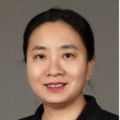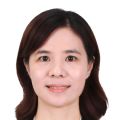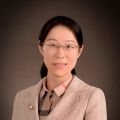Principal Investigators China
Professor Xuetao Cao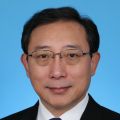 Professor of Immunology CAMS/PUMC Professor of Immunology CAMS/PUMCProfessor Xuetao Cao is the current President of Nankai University, China and the former President of the Chinese Academy of Medical Sciences and Peking Union Medical College until February 2018. Professor Cao was elected to the Chinese Academy of Engineering in 2005, German Academy of Sciences in 2013 and French Academy of Medicine in 2014. He was President of Chinese Society for Immunology for 8 years (2006.10-2014.10). He is currently the Secretary General of Chinese Society for Immunology (2014.10- ), President of Federation of Immunological Societies in Asia and Oceania FIMSA (2012.5- 2015.6) and President of Global Alliance for Chronic Diseases GACD (2013.12-2015.12). Professor Xuetao Cao’s major interests are innate response and immune regulation, immunobiology of APCs (dendritic cells, macrophages), cancer immunotherapy. He has made important contributions to the understanding of signaling pathways in innate immunity and inflammation, identification of immune cell subsets and new immune molecules in immune response and cancer, all of his work was completed in China. View Xuetao Cao's full profile
|
Professor Wei He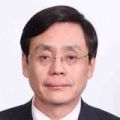 Professor, Institute of Basic Medical Sciences, CAMS/PUMC Professor, Institute of Basic Medical Sciences, CAMS/PUMCIn Aug. 1994, Professor He returned to China and joined the laboratory of Professor Denain Ba in Department of Immunology, Institute of Basic Medical Sciences, Chinese Academy of Medical Sciences (CAMS) & School of Basic Medicine, Peking Union Medical College (PUMC). One year later, he obtained a full Professorship in CAMS & PUMC, and developed his interest in γδT cells, going on to obtain a dozen national and international grants leading his students to embark on the study of γδT cells, focusing on a relationship with tumour-immunology. Wei He is also a leader in the Chinese Society for Immunology (CSI) (Secretary General 2001-present, Vice-President 2010-present), and represents CSI at the International Union of Immunological Societies (IUIS) as the Member, Education Committee of IUIS (2005-present).
|
Professor Zihe Rao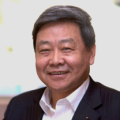 Professor of Structural Biology Professor of Structural BiologyProfessor Zihe Rao graduated from the University of Science and Technology of China (USTC) in 1977, and got his master degree from the Institute of Biophysics, Chinese Academy of Sciences (CAS) in 1982. In 1989, Professor Rao received his doctorate from Melbourne University and then joined Prof. Dave Stuart’s group in Oxford University, where he worked until 1996. He is now a professor and head of the Laboratory for Structural Biology at Tsinghua University. Professor Rao's interests are Structural Virology; Structural Biology; Mechanical signaling in tumor and immunology.
|
Professor Tao Cheng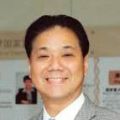 Director and Professor, Institute of Haematology and Blood Diseases Hospital, CAMS/PUMC Director and Professor, Institute of Haematology and Blood Diseases Hospital, CAMS/PUMCProf. Cheng‘s laboratory primarily focuses on both genetic and epigenetic mechanisms in hematopoietic stem and progenitor cells, with each project guided by approaches intended to elucidate basic principles and develop practical strategies. Leukemia and bone marrow failure are the main diseases against which research advances in the laboratory are achieved. Through broadly collaborative approaches, Prof. Cheng is also committed to training haematologists and stem cell biologists, and to building strong haematology and stem cell research programs that will ultimately benefit the patients.
|
Professor Bo Huang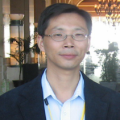 Vice Director of Institute of Basic Medical Sciences, CAMS/PUMC Vice Director of Institute of Basic Medical Sciences, CAMS/PUMCChinese Academy of Medical SciencesProfessor Bo Huang is the Vice-Chairman of Department of Immunology, Chinese Academy of Medical Sciences (CAMS). He received his PhD in biochemistry and molecular biology from Tongji Medical College, Huazhong University of Science and Technology. He finished his postdoctoral training in the Karolinska Institutet in Sweden, University of Calgary in Canada, and Mount Sinai School of Medicine in United States. He is currently a Professor in the Department of Immunology, Chinese Academy of Medical Sciences (CAMS). Professor Bo's major interests are Tumour immunology; Microparticles in tumour and immunology; Metabolism in tumour and immunology;Mechanical signalling in tumour and immunology.
|
Professor Chenyu Jiang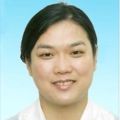 Professor and Executive Vice Dean of School of Basic Medical Sciences Professor and Executive Vice Dean of School of Basic Medical SciencesProfessor Jiang's research is to elucidate molecular pathogenesis of Acute Respiratory Distress Syndrome induced by RNA viruses such as SARS-CoV, Avian and Swine Influenza, and Ebola. Her group has also studied molecular mechanism of lung fibrosis, Psychiatry and Cancer. She has proposed a number of repurposing drugs after elucidation of disease molecular targets. She published extensively in peer-reviewed journals including Nature, Nature Medicine, Molecular Psychiatry, Cell Research, and Nature Communications. She is also an inventor of a number of international patents. Some of the patents are exclusively licensed to a top 5 international pharmaceutical companies. She received numerous honors including “Cheung Kong” Scholar, the young woman scientist of China, and national outstanding young award fund. Professor Jiang's main interests are Medical Biochemistry and Molecular Biology and Respiratory Disease. View Chenyu Jiang's full profile
|
Professor Jiandong Jiang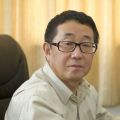 Director of Institute of Materia Medica Director of Institute of Materia MedicaDr. Jiang obtained his M.D. degree in the Fudan University Shanghai School of Medicine (1988). He then spent 18 years in the Department of Medicine at the Mount Sinai Hospital. Dr. Jiang came back to China in 1999 and worked as the director of the Institute of Medicinal Biotechnology, Chinese Academy of Medical Sciences (CAMS) / Peking Union Medical College (PUMC) from 1999 to 2010. Dr. Jiang is currently the president of the Institutes of Pharmaceutical Sciences as well as director of the Institute of Materia Medica, CAMS / PUMC. In addition, he serves as the Chair of Department of Pharmacology in PUMC, and Editor-in-Chief for the Journal of Acta Pharmaceutica Sinica. Dr. Jiang’s research focuses on the drug R&D covers infectious diseases, cancer and metabolic disorders. Dr. Jiang holds 14 approved patents and has published over 160 articles in journals like Nature, Nature Medicine, Cancer Cell, Hepatology, PNAS et al. Two accomplishments of innovative drug research have been translated into clinical use, with one for the treatment of drug-resistant hepatitis B and one for treating metabolic syndromes. He has received two National Awards in China for his contribution in drug discovery. View Jiandong Jiang's full profile
|
Professor De-pei Liu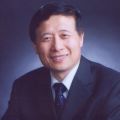 Director of National Laboratory of Medical Molecular Biology, CAMS & PUMC Director of National Laboratory of Medical Molecular Biology, CAMS & PUMCDr. De-Pei Liu graduated with a Ph.D. from CAMS & PUMC in 1986. He completed his Postdoctoral training in University of California, San Francisco (UCSF). Dr. Liu is currently a professor and director of State Key Laboratory of Medical Molecular Biology, Institute of Basic Medical Sciences, CAMS) & Peking PUMC. He is also serving as a member of Chinese Academy of Engineering (CAE), member of National Academy of Medicine (NAM) of the National Academies, USA and member of Third World Academy of Sciences (TWAS), Dr. Liu’s research expertise is molecular mechanisms of gene regulation, gene therapy and cardiovascular disease. View De-Pei Liu's full profile
|
Associate Professor Yang Pu
|
PROFESSOR Hong SHang Director of the Key Laboratory of AIDS Immunology of National Health Commission of China, the Vice President of China Medical University (CMU) and the president of the First Affiliated Hospital of CMU Director of the Key Laboratory of AIDS Immunology of National Health Commission of China, the Vice President of China Medical University (CMU) and the president of the First Affiliated Hospital of CMUProfessor Hong Shang received her PhD from Yamanashi Medical University, Japan. Academic contributions have been made in the fields of HIV epidemiology, immunology, virology, and treatment by her group. Shang was the first to describe the epidemic features of HIV among MSM population in China, and proposed a comprehensive prevention and treatment approach. She also discovered novel recombinant viruses and co-identified an intracellular molecule, cofilin, in blood CD4 T cells of HIV patients, as the first molecular marker to quantify HIV-mediated immune dysfunction in blood CD4 T cells. She has also discovered a new HIV-restriction factor, TRABD2A, and described how resting CD4 T cells restrict HIV-1 virion release. Her studies have led to new therapeutic models for a functional cure of HIV infection. Shang discovered biomarkers (eg. microRNAs) predicting HIV rapid disease progression in the early stage of HIV infection, opening up a new approach to the diagnosis and prognosis of HIV-1 infections in clinical laboratories. Shang assessed the effect of hepatitis coinfection on clinical outcomes and adverse effect of antiretroviral therapy, strengthening the recommendation to systematically test all HIV-positive patients for HBV, HCV, and HDV, to expand HBV vaccination, and the access to treatment for viral hepatitis. Shang has published 153 research articles as the first author and the correspondence author in Nature, Nat Immunol, Science Advances, Lancet Infect Dis and etc. Five of her research findings have been authorized with invention patents. View Hong Shangs's full profile
|
PROFESSOR CHEN WANG
Professor of respiratory diseases, President of the Chinese Academy of Medical Sciences (CAMS) and Peking Union Medical College (PUMC). Professor Wang has long been engaged in clinical practice, teachings and research on respiratory problems such as pulmonary embolism, pulmonary hypertension, respiratory failure, pulmonary heart disease, chronic obstructive pulmonary diseases (COPD, Chronic Bronchitis Emphysema), new respiratory infectious diseases and tobacco epidemiology.
|
Professor Jianwei Wang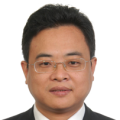 Director of Scientific Research Office CAMS/PUMC, Deputy Director (CAMS) CAMS Oxford Institute Director of Scientific Research Office CAMS/PUMC, Deputy Director (CAMS) CAMS Oxford InstituteProfessor Jianwei Wang has been the director and associate professor (2005-2008)/full professor (2008-) of Christophe Merieux Laboratory, Institute of Pathogen Biology (IPB), Chinese Academy of Medical Sciences (CAMS) & Peking Union Medical College (PUMC) since 2005 after he worked in China CDC for 8 years. He was the board member of national R&D high-tech project (863 project, 2011-2015). He also serves as the board member of National Major Project of Prevention and Treatment of AIDS, Hepatitis and Other Major Infectious Diseases in China. He is the recipient of National Fund of Distinguished Young Scientist (2012) and Changjiang Scholarship Professor (2014). He is the member of editorial board of many science journals and standing members of academic societies. He has authored or co-authored more than 100 original papers in international peer-reviewed journals, including 80 corresponding author papers. His main interests are Immunology of respiratory virus infection; virus-host interaction; innate immunity. View Jianwei Wang's full profile
|
Professor Ruozheng Wang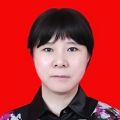 Professor of radiation oncology, Consultant in Radiation Therapy, Director of CAMS key laboratory of Radiation Cancer Immunology Professor of radiation oncology, Consultant in Radiation Therapy, Director of CAMS key laboratory of Radiation Cancer ImmunologyProfessor Wang graduated from Xinjiang Medical University with BM degree in 1986, PHD degree in 2011 and completed postdoc training in Tianjin Medical University in 2015. She worked as registrar and consultant in Affiliated Tumour Hospital since 1991. During this period, she has visited MRC Human Immunology Unit (HIU) in University of Oxford and Nebraska Medical Center in US for futher training in immunology and radiation oncology. Her main research interst is to understand how T cells, especially cytotoxic T cells, are involved in the initiation and progression of various type of cancer, such as nasopharyngeal cancer and cervical cancer. We would also like to discover novel targets of immune therapy which is important in precision medicine. Her research projects are mainly funded by National Natural Science Foundation of China and Minister of Science and Technology. She has established nation-wide collaboration as well as international collaboration with Professor Tao Dong in University of Oxford. By far, she published 16 SCI papers. Thirty-seven postdoctoral researchers, PhD students and master candidates have worked or supervised by her. From 2015-2017 her group won three major awards from the Scientific and Technological Progress Prize in Xinjiang Uygur Autonomous Region. View Ruozheng Wang's full profile
|
Professor Chen Wu Professor, National Cancer Center/Cancer Hospital Deputy Director Professor, National Cancer Center/Cancer Hospital Deputy DirectorProfessor Wu's main research aims are to further analyzing genomic data of gastroenterology cancers and to characterize the functions and molecular mechanisms of identified genes and their variants in these cancers She has been focusing on cancer genetics and genomics. His group conducted several genome-wide association studies of esophageal squamous-cell carcinoma (ESCC), pancreatic cancer et al in Chinese populations and identified several novel loci or variants associated with risk of the development of these cancers. They have not only continued but also expanded the research into two aspects: one is to further analyze genomic data of esophageal and pancreatic cancer and the other is to characterize the functions and molecular mechanisms of identified genes and their variants in these cancers. Current work is focusing on functional genomics screening of susceptible or driver genes and elucidation of the biological mechanisms of these genetic variations in ESCC.
|
Professor Xuan Zhang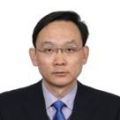 Director of the Department of Research PUMC Hospital Director of the Department of Research PUMC HospitalProfessor Xuan Zhang is Professor and Director of the Department of Research, Peking Union Medical College (PUMC) Hospital and Director of the Clinical Immunology Centre, Chinese Academy of Medical Science. His speciality and research field of interest is Rheumatology and Clinical Immunology. He has engaged in clinical diagnosis, treatment, and research of pathogenesis of the Rheumatism immunity disease, the emphasis is the systemic lupus erythematosus, the rheumatoid arthritis and the immune interstitial pneumonia. View Xuan Zhang's full profile
|
Professor Xue Zhang Professor and Chair of Medical Genetics, Vice President CAMS/PUMC Professor and Chair of Medical Genetics, Vice President CAMS/PUMCProf. Zhang’s research focuses on the molecular basis of rare Mendelian disorders. He has discovered the disease genes underlying several monogenic disorders, including familial acne inversa, Marie Unna hereditary hypotrichosis, familial idiopathic basal ganglia calcification and syndactyly type V, and identified the pathogenic genomic rearrangements for congenital generalized hypertrichosis terminalis, X-linked congenital hypertrichosis syndrome and syndactyly type IV. These findings have been published in high profile journals including Science, Nature Genetics and American Journal of Human Genetics. Prof. Zhang has been on the editorial board of several international journals, including American Journal of Human Genetics, Annual Review of Genomics and Human Genetics, and Journal of Investigative Dermatology.
|
Professor Yonghong Zhang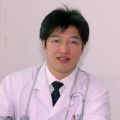 Director of Research Centre for Biomedical Resources, Director of Scientific Research Office, Beijing Youan Hospital, Capital Medical University Director of Research Centre for Biomedical Resources, Director of Scientific Research Office, Beijing Youan Hospital, Capital Medical UniversityProfessor. Yonghong Zhang received his D.Phil from Oxford University. He is currently a senior clinician in Beijing Youan Hospital and Associate Professor at Capital Medical University, Beijing. Yonghong’s major interest is in anti-viral immunity and genetic association in virus infections such as influenza, HIV, HCV and HIV/HCV co-infection. Yonghong’s current work is focusing on IFITM3 genetic variant in association with severe influenza in China. He also showed evidence that the CTL driving pressure has a major effect on inter host HIV-1 viral diversity and probably represents a key element of viral control. In addition, Dr Zhang identified the immune mechanisms of HLA-B51-associated protection in HIV infection. As first author, he has published seven original papers in SCI-cited journals including Nature Communication, Journal of Immunology, Blood, Am J Respir Crit Care Med. View Yonghong Zhang's full profile
|
Professor bao lin-linProfessor of Animal Science Professor Bao Lin-lin received her PhD in Veterinary Medicine from China Agricultural University in 2015. She is now the Director of the sub-centre for conservation of laboratory animals and zoonoses associated bacteria at the Institute of Laboratory Animal Science. Her research interests include research of animal models of respiratory infectious diseases (Influenza, MERS, SARS-CoV) and comparative medical research. Her group have developed the hACE2 mouse model and the rhesus monkey model of the novel coronavirus in the COVID-19 pandemic. A key research project studied the pathogenesis, transmission routes and invasion routes of SARS-CoV-2. |
professor wei ge
Wei Ge graduated from the Department of Chemistry of Beijing Normal University with a bachelor's degree, then conducted her graduate studies at University of Oxford with Professor Sir Jack. E. Baldwin, and received her DPhil degree in 2005. From 2005 to 2012, Wei Ge performed postdoctoral research in Professor Christopher J Schofield (FRS) group at University of Oxford. In 2013, she joined the Institute of Basic Medicine CAMS as full Professor and principal investigator. She has been focusing on molecular mechanisms of cancers and immune-related diseases, as well as development of new targeted drugs. |
professor sudan he
Besides apoptosis, other forms of regulated cell death, such as necroptosis, pyroptosis, and ferroptosis, have been identified. We have discovered RIPK3 kinase as an essential molecule of necroptosis and demonstrated how RIPK3 is activated in the necroptosis signaling pathways initiated by the activation of TLR3/4 and HSV infection. We have a long-standing interest in understanding the molecular mechanisms of necroptosis and new forms of regulated cell death, using combined approaches of CRISPR/Cas9-based screening, small molecule inhibitors, etc. |
Professor yuting ma
Yuting MA received her PhD degree in Immunology from Université Paris Sud 11, followed by postdoctoral trainings in INSERM, Institut Gustave Roussy, and Cordelier Research Center in Paris. To extend the pursuit of research in stress response and tumor immunology, she established a laboratory in Institute of Systems Medicine (ISM, Suzhou), Chinese Academy of Medical Sciences in 2015. She is the current Associate Dean of ISM and Chief of Immunology Platform. Her continuous endeavors on these aspects led to over 50 highly-cited publications (>7200 citations) in prestigious scientific journals (Nat Med, Science, Nat Rev Immunol, Nat Immunol, Immunity…), as well as the identification of novel therapeutic targets and prognostic/predictive biomarkers for cancer patients. She is listed as one of the Top 2% Scientists Worldwide 2022 by Stanford University. |
professor catherine wong
I obtained my PhD from the University of Hong Kong in 2003, majoring in Fundamental Mass Spectrometry (Physical Chemistry). Possessing both physical and analytical techniques I thus have solid foundations for interdisciplinary researches. I studied proteomics for 8 years since 2005 in John Yate’s lab. Since then, I have employed this technology to make considerable contributions. My research interests lie mainly on development of cutting-edge mass spectrometry-based proteomic technologies, including Single Cell Proteomics (SCP), 4D-DIA high-throughput technology based on Trapped Ion Mobility-TOF MS, novel methods on protein glycosylation identifications, and new protein database search algorithms. I also work on the translational proteomics to discover authentic disease biomarkers and to unveil disease mechanisms based on well-designed large clinical cohort. |



